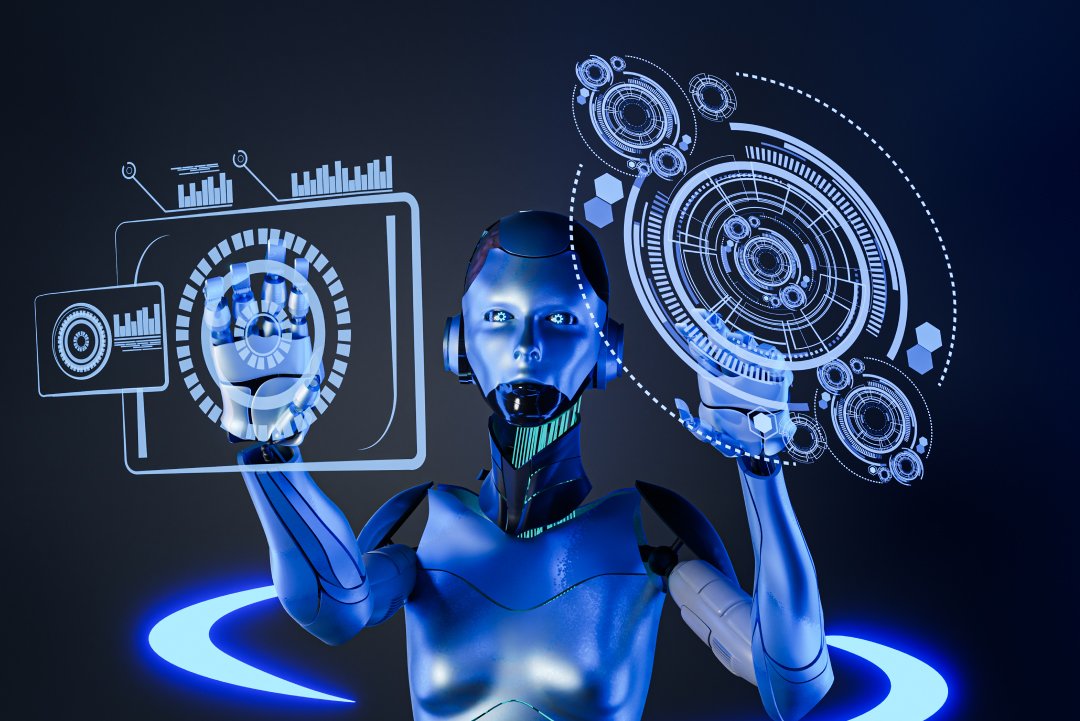Artificial intelligence (AI) and machine learning (ML) have rapidly evolved, significantly impacting various industries, including mobile app development. As these technologies continue to advance, they are reshaping how we create, interact with, and benefit from mobile applications. This article explores the historical development, current state, and future potential of AI and ML in mobile app development, highlighting their transformative impact and future prospects. The intersection of AI and ML with mobile technology has led to groundbreaking innovations in mobile applications. From enhancing user experiences to streamlining development processes, these technologies are revolutionizing the mobile app landscape. In this article, we will delve into the evolution of AI and ML in mobile apps, examining key milestones, current advancements, and future possibilities. We’ll also explore innovative use cases and provide insights into how businesses can leverage these trends to stay competitive.
Historical Milestones

Early Developments and Key Breakthroughs
The journey of AI and ML in mobile app development began with fundamental breakthroughs in AI research and the advent of smartphones. Initially, AI was largely confined to academic and research settings, but with the rise of mobile technology, it began to find practical applications.
One of the earliest significant milestones was the introduction of voice recognition systems, such as Apple’s Siri in 2011 and Google’s Google Assistant in 2016. These applications utilized natural language processing (NLP) and machine learning algorithms to understand and respond to user queries, setting new standards for mobile app intelligence.
Integration of Image Recognition
Another pivotal development was the integration of image recognition technology into mobile apps. For instance, Google Photos, launched in 2015, used ML algorithms to identify and categorize images, making photo management more intuitive and efficient. This period also saw the emergence of predictive text and smart reply features in messaging apps, further demonstrating the potential of machine learning for mobile.
Current State of AI and ML

Recent Advancements and Trends
Today, AI and ML are integral to mobile app development, driving numerous advancements and trends. One of the most notable trends is the rise of AI-driven personal assistants. Beyond basic voice commands, these assistants now manage complex tasks, integrate with other apps, and provide proactive suggestions based on user habits. This level of integration is made possible by advancements in machine learning for mobile, enabling real-time data processing and decision-making.
State-of-the-Art Applications
AI and ML have also transformed mobile gaming, health, and fitness apps. AI algorithms create dynamic and adaptive gameplay experiences, making games more engaging and personalized. In health and fitness apps, AI provides personalized workout plans and tracks user progress with greater accuracy.
Augmented reality (AR) apps are another area where AI and ML shine. These apps use machine learning to enhance real-world interactions, offering users immersive experiences. For example, retail AR apps can analyze user preferences and suggest products in real-time, creating a seamless shopping experience.
The Benefits of AI in Mobile App Development

Enhanced User Experiences
AI-powered mobile apps provide highly personalized user experiences. By analyzing user behavior and preferences, these apps can offer tailored recommendations and content, increasing user satisfaction and engagement. For instance, AI-driven recommendations in e-commerce apps lead to higher conversion rates and sales.
Efficient Development Processes
AI tools significantly streamline the app development process. They can suggest app ideas, predict user behavior, and identify key features. Additionally, AI automates coding and testing tasks, allowing developers to focus on more complex and creative aspects of development. This efficiency results in faster development cycles and reduced costs.
Improved App Performance
AI-powered apps continuously learn and adapt based on user interactions, ensuring that the app evolves to meet user needs. This ongoing improvement leads to better app performance and user satisfaction. For example, fitness apps using AI can provide personalized workout plans and adjust them based on the user’s progress and feedback.
Cost Efficiency
While developing AI-powered apps may initially require a significant investment, the long-term benefits include reduced labor costs and higher returns. AI can automate many aspects of development and customer service, lowering the need for extensive human resources. Additionally, the improved quality and user experience of AI-enabled apps can lead to increased revenue.
AI-Powered Mobile App Development: Challenges and Concerns

Ethical and Privacy Concerns
The integration of AI in mobile app development brings several challenges, particularly related to ethics and privacy. AI systems often require access to large amounts of user data, raising concerns about data privacy and security. Ensuring that user data is protected and used responsibly is crucial for maintaining user trust.
Bias and Discrimination
AI algorithms can sometimes exhibit bias, leading to discriminatory outcomes. This issue arises from biases present in the training data or the algorithms themselves. Addressing this concern requires careful selection of training data and continuous monitoring and adjustment of AI systems to ensure fairness and equity.
Reliability and Security
The reliability and security of AI systems are also critical concerns. AI algorithms must be thoroughly tested to ensure they perform reliably under various conditions. Additionally, robust security measures must be in place to protect AI systems from cyber threats.
Misconceptions and Resistance
There are common misconceptions about the cost and impact of AI in app development. Some believe that AI development is prohibitively expensive, while others fear that AI will replace human jobs. However, AI can enhance human capabilities rather than replace them, leading to more efficient and innovative development processes. Companies must address these misconceptions and demonstrate the tangible benefits of AI to gain buy-in from stakeholders.
Future Prospects

Emerging Technologies and Trends
The future of AI in mobile app development is promising, with several advancements on the horizon. One such advancement is federated learning, a new approach to machine learning that enhances data privacy. Federated learning trains algorithms across multiple devices, ensuring that data remains on local devices while still leveraging the power of AI for personalized experiences.
Another significant trend is edge computing, which involves processing data closer to the source (e.g., on mobile devices) rather than in centralized data centers. This approach speeds up data processing and reduces bandwidth usage, making AI-powered mobile apps more efficient and responsive.
Predictions for Future Advancements
As AI technologies continue to evolve, we can expect further advancements in natural language processing, voice recognition, and deep learning. These advancements will enable even more sophisticated and personalized mobile applications. For instance, future AI-powered apps might offer real-time language translation, advanced health monitoring, and more immersive AR experiences.
Increased Adoption and Integration
As the benefits of AI become more apparent, we will see increased adoption and integration of AI technologies across various industries. Businesses that leverage AI in their mobile apps will gain a competitive edge by offering superior user experiences and more efficient services. This trend will drive innovation and growth in the mobile app development industry.
Innovative Use Cases

Healthcare
In healthcare, AI-powered mobile apps can assist in diagnosing diseases, monitoring patient health, and providing personalized treatment recommendations. These applications can significantly improve patient outcomes and make healthcare more accessible.
Education
AI-powered mobile apps can offer personalized learning experiences. These apps can adapt to the learning pace and style of individual students, providing customized content and feedback. This personalized approach can enhance learning outcomes and make education more engaging.
E-commerce
E-commerce companies can use AI to provide personalized shopping experiences, while financial institutions can utilize machine learning to detect fraudulent activities and manage risk more effectively.
Entertainment
In the entertainment industry, AI can be used to recommend content based on user preferences, create more immersive gaming experiences, and even generate content autonomously.
Application Development Outsourcing
Given the complexity and rapid advancements in AI and ML, many businesses consider application development outsourcing to ensure they remain competitive. By outsourcing mobile development, companies can access specialized expertise, reduce costs, and accelerate the development process. This strategy allows businesses to focus on their core competencies while leveraging the skills of experienced AI app developers.
Conclusion
AI and ML technologies have significantly transformed mobile app development, offering numerous benefits and driving unprecedented growth. From personalized user experiences to efficient development processes, AI-powered tools are revolutionizing how mobile apps are developed and used. However, addressing ethical, privacy, and security concerns is crucial for realizing AI’s full potential.
The future of AI in mobile app development is undoubtedly bright, with emerging technologies and trends poised to drive further innovation. Businesses that embrace AI in their app development processes will maintain a competitive edge, meeting the ever-evolving demands of modern users.
By leveraging the power of AI and ML, businesses can create extraordinary mobile applications that capture users’ attention and drive long-term success. Whether through application development outsourcing or hiring AI app developers, the key to staying ahead in the industry is to integrate AI into your mobile app development strategy. The future of mobile app development is intertwined with AI, promising a more intelligent, efficient, and personalized digital experience.
FAQs
Businesses gain personalized user experiences, efficient development processes, and improved app performance, leading to higher user satisfaction and reduced costs.
Challenges include ethical and privacy concerns, potential biases in AI, and misconceptions about costs. Address these with rigorous testing, transparency, and adherence to privacy regulations.
Federated learning and edge computing are key trends. Federated learning enhances privacy, and edge computing improves efficiency by processing data closer to the source.
Outsourcing provides access to specialized expertise, reduces costs, and speeds up development, allowing businesses to leverage experienced AI app developers while focusing on core activities.
AI and ML offer personalized recommendations, adaptive interfaces, and intelligent features, making apps more engaging, intuitive, and valuable to users.
About Softvil
Softvil is a leading technology company renowned for its expertise in artificial intelligence (AI) and machine learning (ML). With a commitment to innovation, Softvil excels in integrating cutting-edge AI technologies into mobile app development, delivering personalized and intelligent user experiences. Their team of seasoned AI app developers specializes in creating sophisticated applications that leverage AI for enhanced performance and efficiency. Whether through in-house projects or mobile development outsourcing, Softvil stands at the forefront of AI-driven solutions, helping businesses stay competitive in a rapidly evolving digital landscape. Their proficiency in AI ensures the delivery of top-tier, intelligent mobile applications tailored to meet diverse industry needs.

